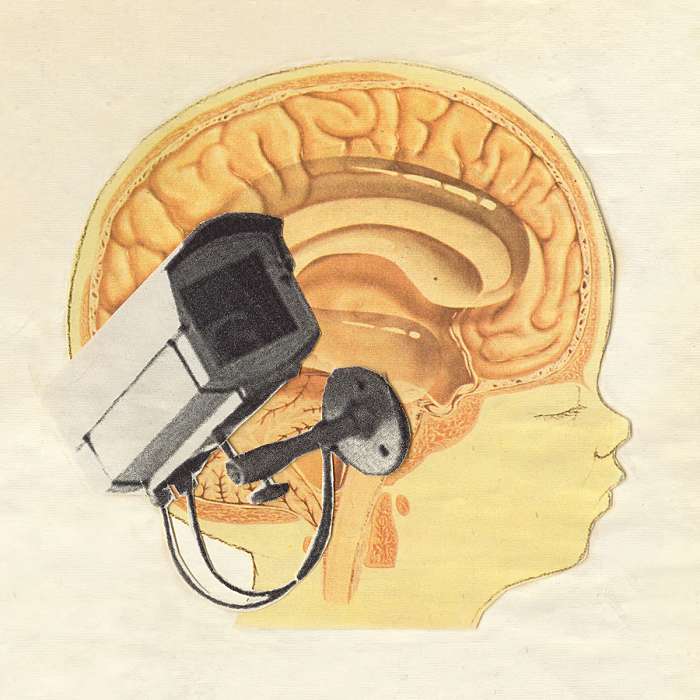To speak of an artist’s “growth” is an unforgivable cliche, but it’s hard to describe Origin:Orphan, The Hidden Cameras’ latest release, as anything but an evolutionary leap beyond their previous efforts. With this album, their fourth studio record proper, Toronto’s self-proclaimed “mild-mannered army” have sunk their roots deeper, branched wider, and gained a new musical maturity–simultaneously finding inspiration from more unexpected sources and creating some of their catchiest songs to date. “This album is a foray into new territory,” says Joel Gibb, the Cameras’ founder and front man, “exploring genre as a theme in itself while retaining classic Hidden Cameras moments.” Gibb has been spending time in Berlin for the last four years, and attributes at least some of the band’s mounting sophistication to his exposure to German classical music. “Ratify the New”, the first track on Origin:Orphan, for instance, starts with a single droning note, sustained for nearly two and a half minutes before Gibb’s voice breaks in. The single note is a musical device that recalls the prelude of Wagner’s opera Das Rheingold, which opens with 136 bars in the chord of E flat major. Yet European high art is not the only influence on the heady brew of this song about the death of old things and the birth of fresh ones. Jamie McCarthy’s violin, tuned to sound like an erhu, the Chinese two-stringed fiddle, repeats a melodic phrase together with drums and cello to sound strikingly like a traditional Chinese orchestra.
It’s no secret that The Hidden Cameras is Gibb’s baby, and, in some ways, we can regard the band as a solo project. He writes all the songs, sings them, plays guitar and a number of other instruments on record, and designs the CD covers and stage sets (he also exhibits his art in galleries around the world). Since his live debut in a Toronto West End art gallery in 2001, a rotating cast of regulars and special guests has contributed to recordings, videos, and live performances across North America and Europe. “We’ve toured Europe many times,” he observes. “We’re an increasingly international band. Origin:Orphan bridges cities; tracks were recorded in Toronto, but overdubbed in Berlin and London.”
Rather than the simple rhythms and hymn-like tunes of years past, Origin:Orphan features more intricate textures and varied atmospheres, often darker ones. The processional pace, minor key, and dramatic orchestration of strings and horns in “Walk On”, for example, give the song a melancholy, almost mournful tone. The album’s title song is another case in point, its echoing drums, a stuttering loop of sampled guitar, and lyrics that meld existential angst with scathing criticism (“A whore when he speaks/A whore when he thinks”) combine to suggest a sinisterly seductive desolation.
Yet upbeat, up-tempo pop songs with joyful, taboo-busting lyrics have always been The Hidden Cameras’ forte, and Origin:Orphan has more than its fair share of them. In “Underage”, Gibb uses jangly guitars that reveal a hint of Afrobeat to craft a tuneful allusion to the advantages of youth (“Let’s do it like we’re underage, that’s the way to be”). A thrift-store Casio keyboard and a chugging beat straight out of the 1980s makes “Do I Belong?” an ode to the anxieties of life and romance, sound surprisingly optimistic. And the eminently hummable and danceable “In the NA,” the album’s first single, finds Gibb playing every instrument except bass and drums. “I worked more on this song than any in my entire life,” he says. “In the NA” also demonstrates that Gibb’s taste for obscure but evocative wordplay remains as strong as ever, the nonsense syllable of the title, acting as a stand-in for any number of words. “It transcends meaning,” remarks the songwriter. “It’s a variable, like x, y, or z.” (A video for “In the NA” is Origin:Orphan’s first, featuring a phalanx of lab-coated spastics who staff an entropic office in a meadow.)
The last track, the 1950s-style ballad “Silence Can Be a Headline”, forms a companion piece to the first, bookending the album with nods to classical music and bringing Origin:Orphan full circle. “It’s a piano pop song that relates to Schubert’s lieder, particularly his Nacht und Traeume (Night and Dream),” Gibb states. “In a sense,” he goes on, “each song here finds its own genre. All the songs are orphans in that way.” It seems unlikely, though, that audiences will leave The Hidden Cameras’ new release orphaned. Origin:Orphan is an invitation from the band to us, an invitation, as the first song suggests, to ratify the new.



